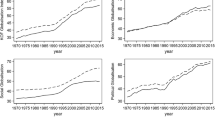Abstract
The ERC has been a pivotal innovation in the set of funding instruments that the European Commission has established for fostering research and innovation in the European Union. With more than 8000 projects funded so far, it is worth asking about empirical evidence regarding the ERC’s specific impact on the social sciences. This article provides some basic data, along with descriptive statistics, on the social scientists who have been sitting on ERC evaluation panels, and on ERC-funded research projects from the social sciences. The article ends with a discussion of the data and poses questions for further investigations.


Similar content being viewed by others
Notes
The analysis follows previous publications of mine on the topic (König König 2016, 2017; König and Gorman 2016). Also, the analysis for this article is part of a broader ongoing effort in which I gauge how the ERC has been dealing with the social sciences: meaning, on the one hand, how the ERC defines, and operationalises, “social sciences” broadly for addressing and attracting respective research fields across Europe and, on the other hand, how the ERC shapes the common understanding of “social sciences” among those who perceive themselves as belonging to this tribe.
Despite this transparency, note that there is some important information missing, primarily due to strict data protection issues. Specifically, no information is available about project proposals that have not been funded—after all, this is almost 90% of all proposals submitted to the ERC. It is impossible to identify, for example, if the ERC funding decisions reflect a certain preference for research topics or methodologies.
The Scientific Council is the steering body of the ERC, consisting of about 20 scientists and scholars from different backgrounds and different parts of Europe.
Note, again, that this number derives from a cut-off date in late 2017 coincidentally chosen by the author and therefore does not include all projects, as mentioned before. By 30 November 2017, several projects selected for funding from the 2016 ERC calls had not yet been contracted by the ERC Executive Agency, while universities across Europe had already been busy proclaiming new ERC grants from the 2017 calls.
Admittedly, this is a crude and, in times of interdisciplinarity, also anachronistic method of identifying different “fields” of research. A topic modelling of all funded projects might yield more interesting findings regarding emerging trends and connections across research fields (cf. Draux and Szomszor 2017). Evidence of the limitations of my crude approach is that one scholar that I count as political scientist in Table 1, Gosta Esping-Andersen, currently leads an ERC-funded project that cannot be counted as political science, and is not featured in Table 2.
This can already be seen from the authoritative legal act formally establishing the ERC (Council of the European Union 2006; cf. also König 2017, 120–1). The ERC has also raised many expectations, and particularly with respect to the social sciences, partly from within the social scientific communities (see Føllesdal 2006) and partly from politicians who, whenever pressed about the fate of research funding for social sciences, quickly refer to the ERC (see Máire Geoghegan-Quinn, in: Mayer et al. 2013, 32).
References
Beerkens, M. 2018. The European Research Council and the academic profession: Insights from studying starting grant holders.
Comité d’éthique du CNRS. 2014. Excellence as a policy in research. Paris: COMETS position paper, CNRS.
Council of the European Union 2006. Decision of 19 December 2006 Concerning the Specific Programme: Ideas Implementing the Seventh Framework Programme of the European Community for Research, Technological Development and Demonstration Activities (2007–2013). EC 2006/972.
Draux, H., and Szomszor, M. 2017. Topic modelling of research in the arts and humanities. An analysis of AHRC grant applications.
Digital Research Reports, London: Arts and Humanities Research Council (AHRC). https://doi.org/10.6084/m9.figshare.5621260.v1.
ERC Executive Agency. 2016. Qualitative Evaluation of completed projects funded by the European Research Council. Brussels: ERC.
Føllesdal, A. 2006. A European Research Council (ERC) for the social sciences and humanities: pros and cons. European Political Science 5: 21–32.
Fuller, S. 2011. The Governance of Science: Ideology and the Future of the Open Society. Buckingham: Open University Press.
Hardeman, S., Van Roy, V. and Vertesy, D. 2013. An analysis of national research systems (I): A Composite Indicator for Scientific and Technological Research Excellence. (Reference Report No. JRC83723), Brussels: European Commission—Joint Research Centre Institute for the Protection and Security of the Citizen.
König, T. 2017. The European Research Council. Cambridge: Polity.
König, T. 2016. Peer review in the social sciences and humanities at the European level: the experiences of the European Research Council. In Research Assessment in the Humanities, ed. M. Ochsner, S.E. Hug, and H.-D. Daniel, 151–163. Cham: Springer. https://doi.org/10.1007/978-3-319-29016-4_12.
König, T., and M.E. Gorman. 2016. The challenge of funding interdisciplinary research: A look inside public research funding agencies. In The Oxford Handbook of Interdisciplinarity, ed. R. Frodeman, J.T. Klein, and R. Pacheco, 513–524. Oxford: Oxford University Press.
Lamont, M. 2009. How Professors Think: Inside the Curious World of Academic Judgment. Cambridge, MA: Harvard University Press.
Langfeldt, L., Scordato, L. 2016. Efficiency and flexibility in research funding. A comparative study of funding instruments and review criteria. (NIFU rapport 2016: 9), Oslo: Nordic Institute for Studies in Innovation.
Mayer, K., König, T., Nowotny, H. 2013. Horizons for Social Sciences and Humanities. (Conference Report), Vilnius: Mykolas Romeris University.
Persson, B. 2017. Interests, ideas and legacies of the past: analysing the positions and strategies of Swedish policy actors in the establishment of the European Research Council. European Educational Research Journal. https://doi.org/10.1177/1474904117719142.
Author information
Authors and Affiliations
Corresponding author
Rights and permissions
About this article
Cite this article
König, T. Political science and the European Research Council. Eur Polit Sci 18, 248–266 (2019). https://doi.org/10.1057/s41304-018-0165-8
Published:
Issue Date:
DOI: https://doi.org/10.1057/s41304-018-0165-8




